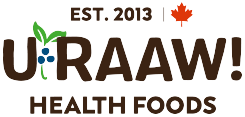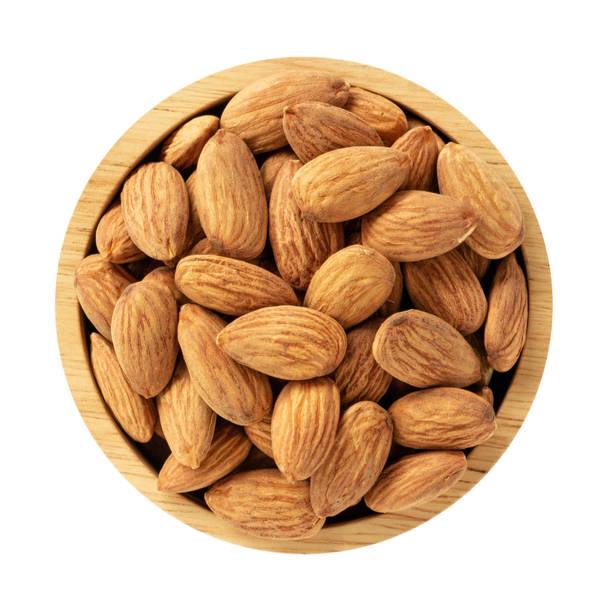




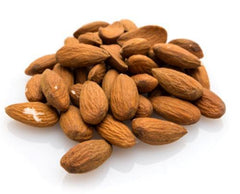
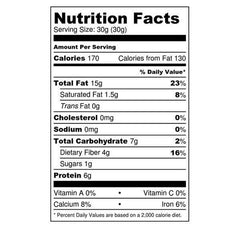
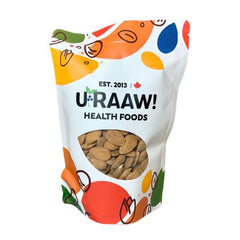
Description
xRich in nutrients and bursting with flavor, it’s no wonder raw organic European almonds are among our most popular nuts. As a standalone snack, almonds shine in trail mixes, salads, and baked goods. Grind them into almond flour for gluten-free baking or make creamy almond butter for a spreadable delight.
Why Almonds Stand Out
Almonds are one of nature’s most nutrient-dense nuts. Packed with essential vitamins, minerals, and healthy fats, they deliver serious nutrition in every bite.
Nutritional Highlights
A 1/4 cup serving of almonds contains:
- Manganese: 45% DV
- Vitamin E: 45% DV
- Magnesium: 25% DV
- Tryptophan: 22% DV
- Copper: 20% DV
- Vitamin B2: 18% DV
- Phosphorus: 17% DV
- Calcium: 11% DV
Each serving also provides over 7.5 grams of protein, fiber, and heart-healthy fats. Their caloric density makes them a filling snack that helps curb cravings.
Health Benefits
Almonds are loaded with heart-healthy monounsaturated fats, similar to those found in olive oil and avocados. Their brown skins contain powerful flavonoids, adding to their health benefits. Research suggests regular almond consumption may:
- Lower LDL (bad) cholesterol
- Reduce diabetes risk
- Aid in weight management
- Decrease the likelihood of gallstones
To enjoy these benefits, aim to consume 15–20 raw organic almonds daily (about 130 calories).
Types of Almonds
Did you know there are two types of almonds?
- Bitter Almonds: Used to produce oils, not eaten due to their toxicity.
- Sweet Almonds: The edible, delicious variety widely consumed in North America.
The two most common varieties of sweet almonds are:
- California Almonds: Often steam-pasteurized due to USDA regulations.
- Spanish Almonds: Typically unpasteurized, offering a raw and natural option.
Why Choose Organic Almonds?
Conventional almond farming often uses pesticides that can harm both human and environmental health. By choosing organic almonds, you support your well-being and promote sustainable farming practices.
FAQ
Q: Are raw almonds safe to eat?
A: Yes, raw almonds are safe to eat, especially when purchased from a reputable source. However, in some regions like the U.S., almonds are often steam-pasteurized to reduce the risk of contamination. If you prefer truly raw almonds, look for unpasteurized European almonds.
Q: How many almonds should I eat daily?
A: A healthy serving is about 15–20 almonds per day (approximately 1 ounce or 130 calories). This provides a good balance of nutrients without excessive calorie intake.
Q: What is the difference between roasted and raw almonds?
A: Raw almonds are unprocessed, retaining their natural flavor and nutrients. Roasted almonds have a richer, toasted flavor but may lose some nutrients during the roasting process, especially if roasted at high temperatures. Choose dry-roasted almonds to avoid added oils.
Q: Can I eat almonds if I have a nut allergy?
A: If you have a tree nut allergy, it’s best to avoid almonds and consult a healthcare professional. Almond allergies can cause reactions ranging from mild to severe.
Q: What are sprouted almonds?
A: Sprouted almonds are raw almonds that have been soaked and allowed to germinate slightly. This process enhances their nutrient availability, reduces phytic acid, and makes them easier to digest.
Q: How do almonds benefit skin and hair?
A: Almonds are rich in vitamin E, a powerful antioxidant that nourishes the skin and protects it from damage. The healthy fats in almonds also help keep skin hydrated and support strong, shiny hair.
Q: Why do organic almonds taste different from conventional almonds?
A: Organic almonds often have a more robust, natural flavor due to the absence of synthetic pesticides and fertilizers. Additionally, the growing practices for organic almonds prioritize soil and plant health, which can enhance their taste.
Q: Can I eat almonds on a keto diet?
A: Yes, almonds are a great option for a keto diet. They are low in net carbs (about 2 grams per 1-ounce serving) and high in healthy fats, making them a perfect keto-friendly snack.
Q: Are almond skins nutritious?
A: Yes, the brown skins of almonds are packed with flavonoids, which work synergistically with vitamin E to provide antioxidant benefits. However, if you find almond skins hard to digest, soaking or blanching them can help.
Q: How are almonds pollinated?
A: Almond trees rely on honeybees for pollination. Almond farming plays a significant role in supporting beekeeping industries, as almond blossoms provide an essential food source for bees in early spring.
Q: Can I make almond milk at home?
A: Absolutely! To make almond milk, blend soaked almonds with water, strain through a nut milk bag or fine mesh sieve, and enjoy a creamy, dairy-free alternative. Add natural sweeteners or flavors like vanilla if desired.
Storage Tips for Maximum Freshness
To maintain freshness, store almonds in an airtight container away from light, heat, and humidity.
- Refrigerated shelled almonds: Up to 6 months.
- Frozen shelled almonds: Up to 12 months.
- In-shell almonds: Longer shelf life due to natural protection.
How to Enjoy Almonds
Almonds are incredibly versatile:
- Eat them raw or roasted.
- Add them to baked goods or trail mixes.
- Make almond butter or almond flour.
- Sprinkle chopped almonds on salads, oatmeal, or yogurt.
If you have trouble digesting nuts, consider soaking them to break down enzyme inhibitors in the skins.
How to Soak Almonds
- Place almonds in a bowl of cool water.
- Soak for 30 minutes, then drain and refill with fresh water.
- Soak for an additional 8–12 hours.
- Dry the almonds using an oven or dehydrator.
Soaked almonds should be refrigerated and consumed quickly due to their moisture content. Dehydrating them is ideal for larger batches.
- Choosing a selection results in a full page refresh.
